A GUEST EDITORIAL: THE POLITICS OF FEAR
By Alison Croggon
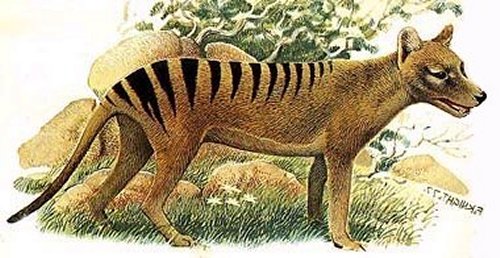
Thylacinus cynocephalus - "The pouched dog with the wolf's head".
Welcome to the fourth issue of Thylazine; The Australian Journal of Arts, Ethics & Literature.
Sometimes I feel like I'm living in a Hollywood marketing campaign. I'm surrounded by signs and they're all saying: Be Afraid. Be very afraid.

|
In this hallucinatory world, what we're absorbing are images: t-shirt demons like Osama bin Laden, guns in the desert, troops marching onto ships, headlines screaming BIONUCLEAR ATTACK, NUCLEAR WAR, SMALLPOX FEARS, TERRORIST STRIKE, ALERT ALERT ALERT ...
Beware. That alien terrorist is gonna get you. |
[Above] Lock and Gun. (artist unknown, 2002)
Well. I'm with most of the world in thinking that a war on Iraq is probably the most cynical exercise in empire-building since the Nazi invasion of Poland. Parallels with the spin campaigns of Hitler and Goebbels in 1930s Germany are being made more and more frequently; they risk losing their point because of their emotive charge but, at the same time, they have a certain relevance. The most telling I have read was a letter in the Guardian by a former Wehrmacht soldier who describes his disillusion marching back from the carnage of Stalingrad through the devastated landscape of Russia: he, too, had believed the claims that the German Government was doing this for the German people. He, like millions of others, lived to find that he was wrong. Many more died for that lie.
However, history is not, as is often claimed, repeating itself. It is making itself every day. George W. Bush's America, this strange militaristic universe of self-fulfilling paranoia, this perversion of the ideals of American democracy, is not Hitler's Germany. There are certain differences: the Treaty of Versailles springs to mind. The American people are not, as the German people were after 1918, suffering the devastating effects of economic punishment, and eager, therefore, to embrace any leader - especially a charismatic leader - who offers an alternative to humiliation.
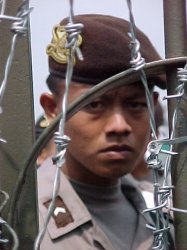
|
America, on the other hand, is still the most powerful economy in the world. The word "freedom", so abused in the Orwellian rhetoric that ballooned around September 11, is double edged. The invasion of Iraq is not a popular war. So far, and despite everything, the American people, and the rest of us in the Western world, are still free people. That freedom is diminishing by the minute before the spectre of Total War, but we mustn't forget it.
The problem is that the mistake the Wehrmacht soldier made is a simple human one. There is to me one overridingly legitimate comparison that can be made with the Third Reich: the skilful political manipulation of the public in the service of interests that are far from the public good. The force that is most potent in manipulating public opinion to diminish our freedom, and one that Hitler, Al Qaeda, Bush, Blair and Howard have all used to their advantage, is simple: fear. |
[Above] Fear Barbs Us All (Photo by Geoff Fox, 2001)
Fear makes people stupid. This is a biological fact: fear releases hormones that inhibit rational thought. This might be a useful survival mechanism in the wild: if a tiger is chasing you, that second that you stop to think whether or not to run away might cost you your life. But it seems a very bad survival tactic for the human race as whole.
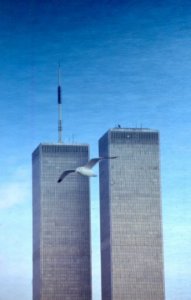
|
It is in the interests of our political leaders, those enthusiastic advocates for the armaments and oil industries, to keep us afraid. If we are afraid, so the reasoning runs, we'll approve those "security measures". We'll project all our terror of mortality onto a worthy demon, like Saddam Hussein. We'll buy into that polar axis of morality, we'll believe that if we're not with you, we're against you, we'll agree that, yes, those illegitimate refugees deserve to be put into desert prisons and brutalised because, after all, they're probably terrorists, and in any case they can't but threaten our "way of life".
And I admit, fear's a hard thing to resist. A plane flies low over my house, and my heart starts pounding. And getting on a plane, difficult for me at the best of times, is these days a real battle with my personal phobias. It's not as if those fanatical Islamists aren't out there with their Wahhabite texts recommending our immolation for the glory of Allah. I think those world leaders who sleep with Bibles by their beds are just as scary and probably more dangerous (they've got bigger weapons): read John's Revelations lately? But. |
[Above] Gull and World Trade Centre, New York, New York, USA. (Photo by Coral Hull, 1998)
Last year I made a resolution, when I found myself quivering at the thought of leaving my bunker, when I found, in reacting, as one must, to the things which troubled me, I was simply becoming reactionary. In doing so, I was letting all the things I hate set my agenda.
So I decided that no matter how scared I am, I won't be ruled by fear. I'll keep on doing the things that matter to me; I'll keep on writing poetry, that futile mark in the sand; I'll protest this war, but I won't forget what I'm protesting for. If I am against the murderous polarities of Good and Evil, then I'm for a complex understanding of this beautiful planet. If I am against war, then I'm for peace. If I am against stupidity, then I am for intelligence. If I am against hatred, then I am for love.
These are not simple polarities. They are a choice: between a tiny world of death, and the huge, contradictory, dangerous, beautiful, joyous world of being. And if I am to remember all these things, I must be prepared to attempt the difficult task of distinguishing reality from seductive hallucination; complex, modest truth from hypnotic generalisation; emotive lie from sober rationality; gross simplification from complex perception.
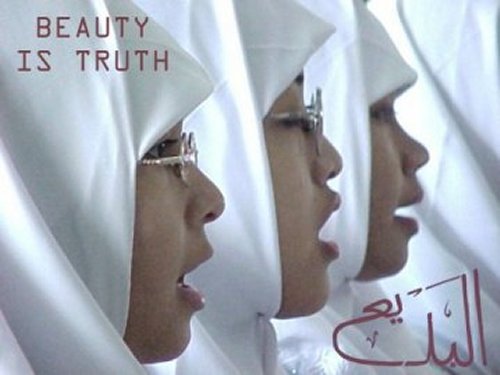
[Above] Beauty is Truth. (Artwork by Geoff Fox and Mustofa Bisri, 2001)
I don't know if this has any significance beyond the merely personal, and I know it is not an answer. But it might be a possible beginning. I am not unmindful of the criticism that this is futile wishfulness dressing itself up as something more important. But nevertheless I hope, however hesitantly, that although the risk of self deception is a real one, it is not entirely irrational or useless to say BOO! to the phantom alien pursuing us down the media byways. One thing that gives me heart is the metaphor of the butterfly effect: in our complex universe, the smallest action has ramifications that we cannot guess. And - more crucially - we cannot preserve our love and our freedom if we are afraid. Albert Camus, in a speech given in 1953, says some things I believe much better than I:
"To achieve [the justice and freedom we need] we must henceforth categorically refuse, without anger but irrevocably, the lies with which we have been stuffed. No, freedom is not founded on concentration camps, or on the subjugated peoples of the colonies, or on the workers' poverty! No, the doves of peace do not perch on gallows! Of that, at least, we shall henceforth be sure, as we shall be sure that freedom is not a gift received from a State or a leader but a possession to be won every day by the effort of each and the union of all."
Alison Croggon (Guest Editorial)
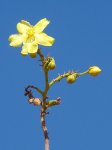
|
Thylazine thanks the following people for their generosity: John Kinsella ($100.00) towards Thylazine No.4.
A special thanks to the contributors; Lisa Bellear, Magenta Bliss, Bev Braune, Nova Braune-Longhurst, Joanne Burns, Alison Croggon, Geoff Fox, Claire Gaskin, John Kidd, Anthony Lawrence, Ian McBryde, Isabel Milham (cover art), Steven Herrick, Coral Hull, John Kinsella (interviews), Cassie Lewis, Jennifer Maiden, Billy Marshall-Stoneking, Ian McBryde, Isabel Milham, Mark O'Connor, Ron Pretty, Dorothy Porter, Brendan Ryan, Tracy Ryan, Kerry Scuffins, Alex Skovron, Alicia Sometimes, Thomas Shapcott, Lauren Williams and the many photographers and other visual artists whose work is included in this issue. |
[Above] Kapok, The Kimberleys, Western Australia, Australia. (Photo by Coral Hull, 2002)
And others; Stephen Booth, C. Campbell from The Thylacine Musuem, Iain Fraser, Nola Fraser, Kindi and Binda who renew my dreams on a daily basis, Jenni Mitchell, "Shamrock" and "Judy" the graceful donkeys at The Good Samaritan Donkey Sanctuary, Pamela Sidney, Jenni Mitchell, the eleven black angus cows from Rylstone: Molly, Emma, Caliban, Millie, Amanda, Monica, Stevie, Maggie, Ruby, Rachel and Faith, all those featured at Thylazine's Australian Poets for Peace and lastly to Josh, Marla and The Envirolink Network (Pennsylvannia, USA) without whose support and assistance this website would not be possible.
About the Writer Alison Croggon
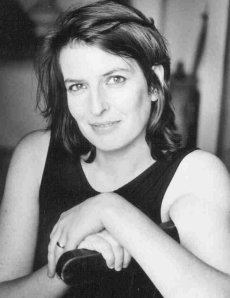
|
Alison Croggon was born in 1962. Her work includes plays, libretti, translations, editing and criticism. Her first novel Navigatio (Black Pepper, 1996) was highly commended in the 1995 Australian/Vogel national literary awards. She has written two operas, The Burrow and Gauguin, with the highly regarded Sydney composer Michael Smetanin, and has completed the libretto for their third, The White Army. Her performed work for theatre includes The Burrow (Perth Festival, Sydney, Melbourne 1994-95 and broadcast by ABC Radio), Lenz (Melbourne Festival 1996), Rules of Thumb (Red Shed Company, Adelaide 1997 and ABC Radio 1998) and Confidentially Yours (Playbox Theatre 1998). ABC Radio National has broadcast a number of her works, including The Burrow, the plays Samarkand and Monologues for an Apocalypse. Many of her poems have been set to music by various composers, including Smetanin (Skinless Kiss of Angels, Elision New Music Ensemble), Christine McCombe and Margaret Legge-Wilkinson (Canberra New Music Ensemble). She is the Editor of Masthead literary arts zine. |
Photo of Alison Croggon by Jacqueline Mitelman, 2001.
I Next I
Back I
Exit I
Thylazine No.4 (September, 2001) |



